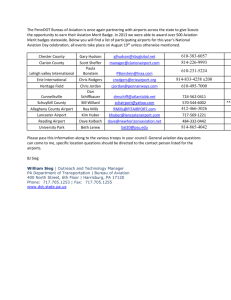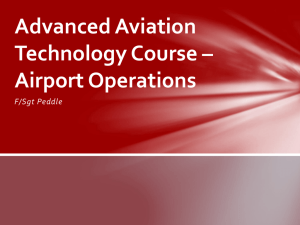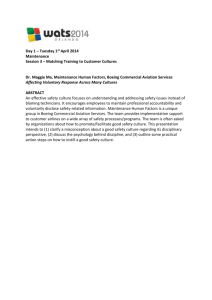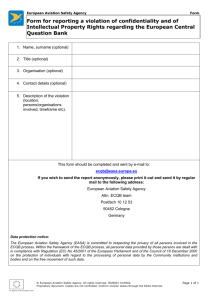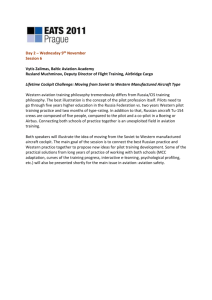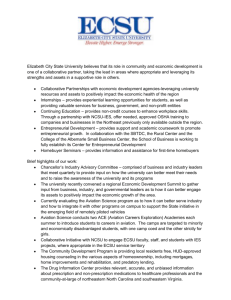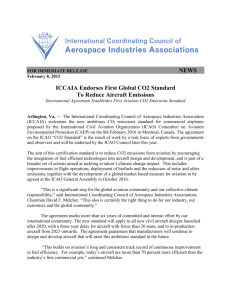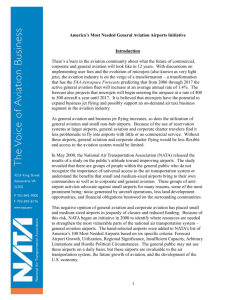View Executive Summary here
advertisement
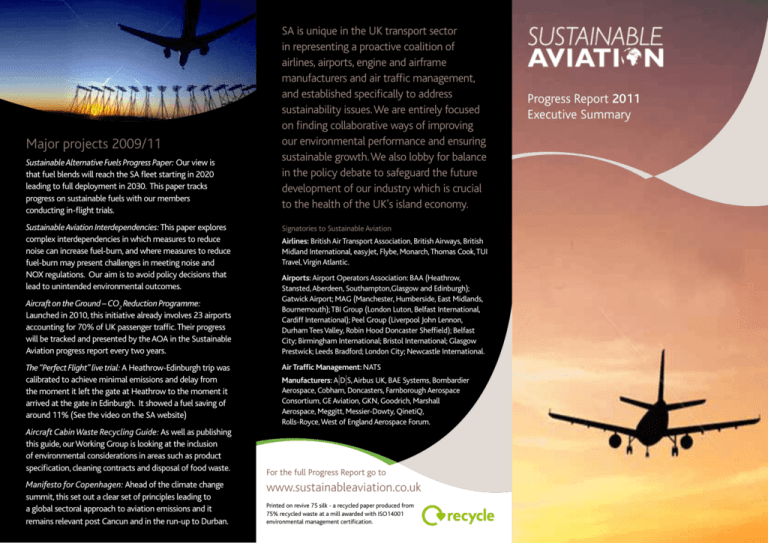
Major projects 2009/11 Sustainable Alternative Fuels Progress Paper: Our view is that fuel blends will reach the SA fleet starting in 2020 leading to full deployment in 2030. This paper tracks progress on sustainable fuels with our members conducting in-flight trials. Sustainable Aviation Interdependencies: This paper explores complex interdependencies in which measures to reduce noise can increase fuel-burn, and where measures to reduce fuel-burn may present challenges in meeting noise and NOX regulations. Our aim is to avoid policy decisions that lead to unintended environmental outcomes. Aircraft on the Ground – CO2 Reduction Programme: Launched in 2010, this initiative already involves 23 airports accounting for 70% of UK passenger traffic. Their progress will be tracked and presented by the AOA in the Sustainable Aviation progress report every two years. The “Perfect Flight” live trial: A Heathrow-Edinburgh trip was calibrated to achieve minimal emissions and delay from the moment it left the gate at Heathrow to the moment it arrived at the gate in Edinburgh. It showed a fuel saving of around 11% (See the video on the SA website) Aircraft Cabin Waste Recycling Guide: As well as publishing this guide, our Working Group is looking at the inclusion of environmental considerations in areas such as product specification, cleaning contracts and disposal of food waste. Manifesto for Copenhagen: Ahead of the climate change summit, this set out a clear set of principles leading to a global sectoral approach to aviation emissions and it remains relevant post Cancun and in the run-up to Durban. SA is unique in the UK transport sector in representing a proactive coalition of airlines, airports, engine and airframe manufacturers and air traffic management, and established specifically to address sustainability issues. We are entirely focused on finding collaborative ways of improving our environmental performance and ensuring sustainable growth. We also lobby for balance in the policy debate to safeguard the future development of our industry which is crucial to the health of the UK’s island economy. Signatories to Sustainable Aviation Airlines: British Air Transport Association, British Airways, British Midland International, easyJet, Flybe, Monarch, Thomas Cook, TUI Travel, Virgin Atlantic. Airports: Airport Operators Association: BAA (Heathrow, Stansted, Aberdeen, Southampton,Glasgow and Edinburgh); Gatwick Airport; MAG (Manchester, Humberside, East Midlands, Bournemouth); TBI Group (London Luton, Belfast International, Cardiff International); Peel Group (Liverpool John Lennon, Durham Tees Valley, Robin Hood Doncaster Sheffield); Belfast City; Birmingham International; Bristol International; Glasgow Prestwick; Leeds Bradford; London City; Newcastle International. Air Traffic Management: NATS Manufacturers: A D S, Airbus UK, BAE Systems, Bombardier Aerospace, Cobham, Doncasters, Farnborough Aerospace Consortium, GE Aviation, GKN, Goodrich, Marshall Aerospace, Meggitt, Messier-Dowty, QinetiQ, Rolls-Royce, West of England Aerospace Forum. For the full Progress Report go to www.sustainableaviation.co.uk Printed on revive 75 silk - a recycled paper produced from 75% recycled waste at a mill awarded with ISO14001 environmental management certification. Progress Report 2011 Executive Summary Executive Summary Jill Brady, Chair The past two years have been among the most challenging I can remember for the aviation industry. It is testament to the seriousness with which the industry views its environmental responsibility that commitment to Sustainable Aviation among our membership has remained constant. Our members have continued to safeguard resource for SA’s pioneering work despite all the pressures on our costs. And we have had a very productive two years! The work addressed in our 2011 Progress Report spans our industry. It has brought together recognized experts in their fields to help lead specialist work packages that can – and will – change the face of aviation in the UK. Our work over the past two years includes: new thinking on how to manage aircraft waste and airport emission levels active support for development of sustainable alternative fuels and sponsored in-service trials proving work on the fuel and CO2 benefits of optimised air traffic management (ATM) procedures and airport operations a realistic assessment of some difficult issues where an improvement in one area can create a setback in another. The UK Government will publish updated growth forecasts on passenger demand and CO2 later this year, and we have therefore delayed further work on updating our CO2 Road Map until we can reflect that data since the ongoing trend in actual emissions will have been distorted, at least in the short term, by the economic recession and the volcanic eruption in Iceland in 2010. Our members recognize that we can achieve more together through SA than we can individually. Sharing expertise and working collectively is SA’s core strength. We take very seriously our work to improve the environmental performance of the UK industry, however emissions remain a global challenge. The CO2 we may save won’t create a halo over the UK. The importance of a global deal on aviation emissions remains paramount and we will continue to work with our colleagues worldwide, and to lobby for a global solution. Equally we must not allow policy makers to lose sight of the importance of aviation as a key driver of the UK economy. SA also has a role to play in winning support and recognition of aviation’s role in the UK’s economic growth and to the global economy in a globalised world. It has shaped the world we all live and work in today. Our work programme over the next two years will therefore be crucial in further proving the credibility of our central proposition that aviation can grow sustainably. We will be seeking to expand our existing evidence base to contribute maximum value to the political debate. Specifically, in addition to our ongoing environmental work, we will be undertaking a work package exploring the social and economic contribution that aviation makes to the UK’s island economy.

